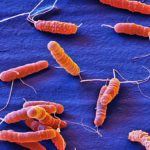Lien vers Pubmed [PMID] – 18025096
Infect. Immun. 2008 Feb;76(2):497-509
Carbon dioxide occupies a central position in the physiology of Helicobacter pylori owing to its capnophilic nature, the large amounts of carbon dioxide produced by urease-mediated urea hydrolysis, and the constant bicarbonate supply in the stomach. Carbonic anhydrases (CA) catalyze the interconversion of carbon dioxide and bicarbonate and are involved in functions such as CO(2) transport or trapping and pH homeostasis. H. pylori encodes a periplasmic alpha-CA (alpha-CA-HP) and a cytoplasmic beta-CA (beta-CA-HP). Single CA inactivation and double CA inactivation were obtained for five genetic backgrounds, indicating that H. pylori CA are not essential for growth in vitro. Bicarbonate-carbon dioxide exchange rates were measured by nuclear magnetic resonance spectroscopy using lysates of parental strains and CA mutants. Only the mutants defective in the alpha-CA-HP enzyme showed strongly reduced exchange rates. In H. pylori, urease activity is essential for acid resistance in the gastric environment. Urease activity measured using crude cell extracts was not modified by the absence of CA. With intact CA mutant cells incubated in acidic conditions (pH 2.2) in the presence of urea there was a delay in the increase in the pH of the incubation medium, a phenotype most pronounced in the absence of H. pylori alpha-CA. This correlated with a delay in acid activation of the urease as measured by slower ammonia production in whole cells. The role of CA in vivo was examined using the mouse model of infection with two mouse-adapted H. pylori strains, SS1 and X47-2AL. Compared to colonization by the wild-type strain, colonization by X47-2AL single and double CA mutants was strongly reduced. Colonization by SS1 CA mutants was not significantly different from colonization by wild-type strain SS1. However, when mice were infected by SS1 Delta(beta-CA-HP) or by a SS1 double CA mutant, the inflammation scores of the mouse gastric mucosa were strongly reduced. In conclusion, CA contribute to the urease-dependent response to acidity of H. pylori and are required for high-grade inflammation and efficient colonization by some strains.

